Some may question whether the world needs another Marvel game.
Yet the success of Netmarble's Marvel Future Fight, as highlighted in this week's Charticle, suggests there's plenty more headroom for games based on the Disney-owned superheroes licence.
The Korean publisher - which strategically backed by Tencent and NCsoft is currently expanding its operations globally - recently announced that the RPG had hit 10 million downloads across Google Play and the App Store.
And, of course, we wanted to know how well (and where) these downloads are being converted into paying gamers.
Weighty matters
A squad-based RPG that enables you to team up superheroes such as Spider-Man, Daredevil and The Avengers, with villains like Doctor Octopus, Loki, and Ultron, Marvel Future Fight has no doubt ridden the wave of publicity surrounding the release of the Avengers: Age of Ultron movie.
Interestingly, on iOS, it's proved to be more popular in terms of download ranking on iPad than iPhone. For example, it's been a top 10 downloaded iPhone game in 46 countries, but 137 countries on iPad.
Likely this is a byproduct of its file size. Quoted as over 400MB on the App Store, Marvel Future Fight installs as a massive 860MB game.
For that reason, on iOS we're looking at the game's top grossing performance on iPad.
In the top English language countries, Marvel Future Fight has been generally within the top 100. In the UK it's peaked higher than in the US, perhaps as Avengers: Age of Ultron movie was released earlier there.
The game's performance has been more consistent in the larger market, though, remaining within the US top 100, apart from one blip.
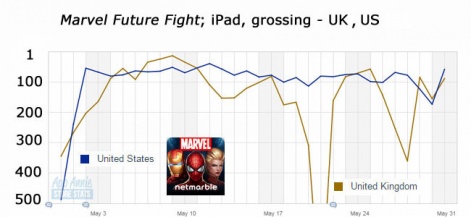
In key European markets - France and Germany - Marvel Future Fight has performed better and worse.
In France, it's ranked high in the top 100, although more recently slipping out. In Germany, however, the grossing rank has been volatile and low: its peak is outside the top 100 and looks unlikely to break in.
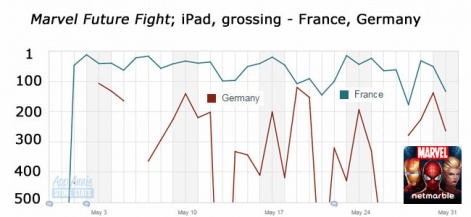
Instead, to find the markets that best demonstrate Marvel Future Fight's success, we need to look to Asia.
Unsurprisingly, given the game was developed in Netmarble's home territory of South Korea, this is the game's best performing iPad market, albeit closely followed by Hong Kong, and to a lesser extent Taiwan.
Marvel Future Fight is yet to be released in China; again this maybe due to file size issues.
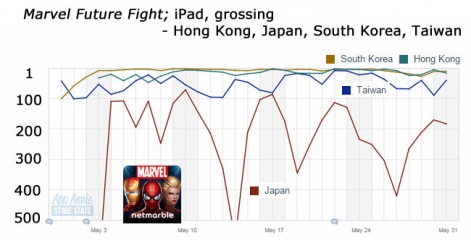
Even in Japan, which isn't renown for its acceptance of western superheroes, Marvel Future Fight has performed admirably.
Although only peaking within the top 100 on two occasions, the lucrative nature of the market, means the game will be generating good sales on iOS.
Go Google
However, to see where Marvel Future Fight has performed the best in terms of platform, we need to switch from iOS to Google Play.
Although direct comparisons can't be drawn between App Store and Google Play rankings because of the different ways Apple and Google use to generate their data, it's clear that in the four western countries we considered, on Google Play Marvel Future Fight is a solid top 100 performer.
As before, Germany is the weakest market of the four, France the best, with the UK and US inbetween these to and matching each other.
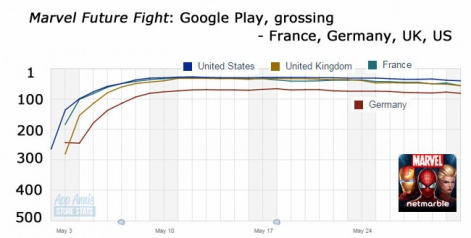
And the picture is similar in the four Asian markets, with Korea leading Hong Kong and Taiwan, and Japan a distance fourth.
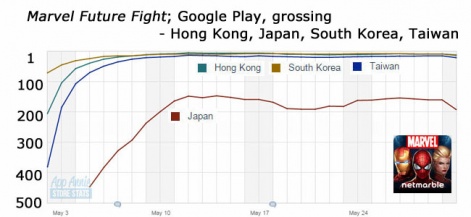
Indeed, given the dominance of Android in the Korean market, the game's performance on its local grossing chart highlights that this is where Marvel Future Fight is generating the largest single chunk of its revenue.
Yet, with the exception on Germany, Netmarble will likely be happy with the game's first month of chart performance. The only issue is that given the competitive nature of all these markets, how long Marvel Future Fight can sustain its top grossing rankings.
















